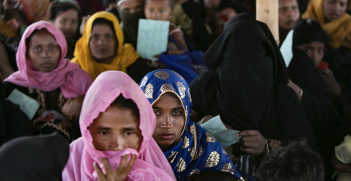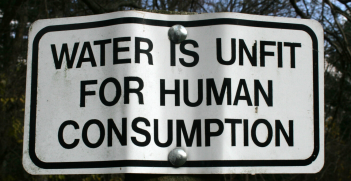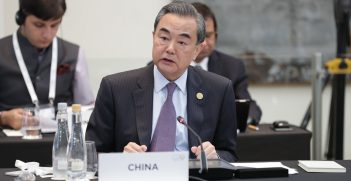Whose Right to Exist? The Changing Voting Patterns of Pacific Islands states on Self-Determination

Despite their reliance on multilateralism when pushing for greater climate action, Pacific Island States have become less willing to recognise the right to self-determination of other vulnerable groups at the UN. This shift in voting erodes norms around global solidarity and may prove ultimately self-sabotaging.
Approaching COP29, the Chair of the Alliance of Small Island States (AOSIS), Fatumanava-o-Upolu III Dr Pa’olelei Luteru, emphasised how the citizens of these nations “are fraught with the fear” that climate change “could completely dismantle their lives.” He claimed that Small Island States (SIDs) “are the moral voice of climate action” and concluded “[w]e are all in this together…”
This claim of existential crisis has been made consistently by AOSIS at nearly every global forum on climate change. But now not only is the unity of the AOSIS increasingly frayed between its developed and the developing members, their claims of being a moral centre and appealing to global solidarity—that “we are in this together”—ring profoundly hollow against the international behaviour of some of its Pacific members.
Of the 39 members of the AOSIS, over a third (16 in total) are from the Pacific. Together they are only responsible for less than 0.03 percent of global emissions. It is a clear injustice that these nations face such an existential threat based on emissions they have barely contributed to.
But what of the rights of other peoples as independent political communities if they are not threatened as much by climate change but other existential threats? It is on this question that cracks are beginning to show within AOSIS as a large number of the Pacific SIDs nations are actively undermining the basis of their own collective power.
SIDs, it is true, “are vulnerable but not powerless,” and their power derives from multilateralism to overcome the asymmetries of power that usually prevail against them. AOSIS relies on a legal and moral argument for its position in climate summits. While promoting scientific skills and resources for adaptation and pushing for developed states to mitigate are fundamental for their survival, so too is retaining norms around solidarity—without which no state has an obligation to its neighbours, other than non-interference. Consequently, the lynchpin of AOSIS argument has been the staunch advocacy of the universal right of self-determination of all peoples.
Self-determination is the right for a people to determine their political status, freely pursue their economic, social, and cultural development, and dispose of their natural wealth and resources (Article 1 of ICCPR and ICESCR). Self-determination is not a just a right to de-colonisation (UNGA Resolution 1514, 196) but includes analogous cases such as living under oppression, belligerent occupation, apartheid, and even climate threats.
Voting on self determination
The quandary is that many of the Pacific members of the AOSIS have been recently turning away from the universality of the right of self-determination. A key indication can be seen in the voting patterns in multilateral forums on self-determination, especially at the UN General Assembly.
The most telling vote was in September 2024 on draft resolution A/ES-10/L.31/Rev.1 that called for the end of Palestinian occupation within a year, based on the advisory opinion of the International Court of Justice that reaffirmed the Palestinian right of self-determination. With 124 voting to adopt the resolution, it was the Pacific SIDs nations that were the most active states against self-determination. This opposition coalesced in seven leadings members of the Pacific Islands—Fiji, Micronesia, Nauru, Palau, Papua New Guinea, Tonga, and Tuvalu—making up the nine voting against (along with Israel and the US). Those abstaining included Kiribati, Samoa, and Vanuatu.
More recently, in November 2024, was the UNGA vote on the draft resolution that reaffirmed Palestinian self-determination and their right to statehood, calling for the end to Israeli occupation (A/C.3/79/L.49). While an overwhelming majority of 170 states were in favour, the six against included Micronesia and Nauru, and the nine abstaining included Kiribati, Palau, Papua New Guinea, Tonga, and Tuvalu. The votes in May 2024 A/RES/ES-10/23 on Palestinian admission to the UN showed similar patterns. Of the nine against were Micronesia, Nauru, Palau, and Papua New Guinea. The 25 abstentions included Fiji, Marshal Islands, and Vanuatu.
This mirrored the vote almost a year earlier in October A/C.3/78/L.24 and December on A-78-479 regarding the right of Palestinian self-determination. Marshal Islands, Micronesia, and Nauru again voted no and the states abstained were similar, Kiribati, Palau, Papua New Guinea, and Tonga, with Tuvalu and Vanuatu shifting on each.
These votes may be contextually specific to the question of Palestine. If we look at other resolutions related to self-determination, a similar pattern is evident.
Since 1987 there has been a mandate focused on the use of mercenaries to violate human rights and impede self-determination. Most recently, these were voted on in 2021 A/RES/76/151 and 2023 A/RES/78/191. This is a theme relatively uncontroversial for Pacific states and yet showed only marginally more appeal.
The cases of Western Sahara and West Papua are perhaps the greatest indicators of the waning commitment to self-determination across Pacific states. Back in 1985, Resolution 40/50 (1985) emphasised the right of Western Sahara to exercise self-determination and was supported by the vast majority of Pacific states including Fiji, Vanuatu, Papua New Guinea, and Samoa. The Solomon Island’s abstained. But in the 2000s, and after the entry of new Pacific states, the commitment to self-determination began to dilute and many derecognised the Sahrawi Arab Democratic Republic (SADR). Only Timor-Leste retains strong support for Western Sahara in diplomatic forums, seeking the application of international law against expansionist ambitions.
The more thorny case in terms of regional stability and justice is West Papua. Vanuatu has been a vocal advocate for West Papua, and the Solomon Island’s championed its cause at the UNGA in 2015 under Prime Minister Manasseh Sogavare. Arguably the watershed was in 2017 when Vanuatu, Solomon Islands, Tonga, Tuvalu, Nauru, Palau, and even the Marshall Islands delivered a joint statement to the African, Caribbean, and Pacific group of states to back West Papuan self-determination. However, in 2023, the Melanesian Spearhead Group (MSG)—which includes Solomon Islands, Fiji, Vanuatu, and Papua New Guinea—claimed the United Liberation Movement for West Papua (ULMWP) did not meet the “existing criteria.”
Such voting patterns stand in sharp contrast to that during the 1970-1990s when the Pacific Islands were staunch supporters of self-determination, even for Palestine. During this period, tensions in East Timor, New Caledonia, French Polynesia, the slow process of independence of the Federated (or ‘associated’) states, and the conflict in Bougainville, meant a heightened importance attached to self-determination. Even in the 1990s this position on the universality of self-determination held. For example, for voting on A/49/PV.94 in 1994 and A/RES/49/149 in 1995 on self-determination of Palestine, only Israel and the US voted against. Of the 19 that abstained only Marshall Islands and Micronesia were from the Pacific.
This demonstrates waning support for the universality of the right of self-determination among the more established Pacific islands suffering direct, existential threats from climate change. Many of these now often abstain on general matters regarding self-determination—especially Kiribati, Palau, Papua New Guinea, Tonga and to a lesser degree Tuvalu and Fiji. And in specific cases such as Palestinian, West Saharan, and West Papuan self-determination, there has been a growing tendency to vote against. Vanuatu and Solomon Island’s, once staunch supporters of self-determination, are now split on Palestine and Western Sahara. The only remaining state consistent in principle and deed on self-determination is Timor-Leste.
The diplomatic contradiction
On its face, this new position to self-determination of key Pacific states seems hypocritical and unethical. Practically, they are undermining the legal and normative framework of the self-determination they rely on for climate justice.
In regards to A/RES/ES-10/23, the Palestinian Ambassador Riyad Mansour described how “A yes vote is a vote for Palestinian existence, it is not against any state.” This is what seems to not be registering in some Pacific islands who remain obstinate about their own right to exist but are increasingly indifferent to others.
Melissa Stewart, of Georgetown Law, has identified how the problem of “sinking states”—those states suffering impacts of sea rises—reveals weaknesses in the state-centric model of international law and the dangers of retreating from self-determination. Playing into the geopolitics of Great Powers is serving to only marginalise even further issues that are critical to Pacific Island communities.
The statement by Fiamè Naomi Mata’afa, prime minister and minister of foreign affairs of Samoa echoes this lack of diplomatic reflexivity. She has stated that “Pacific countries need to stand together as a region to protect from the current geopolitics and power play.” This only goes half-way. International law is not regional, it is global. It must apply everywhere, or it does not apply anywhere. While acting as a regional bloc magnifies voting power, it does not necessarily further the form of international law and principles Pacific states require. By undercutting self-determination elsewhere, these voting patterns undercut the Pacific too. All AOSIS nations must normatively recommit to self-determination and solidarity for all peoples as essential to meet their own existential crises.
This article is part one of a two-part series. Part two will be published next week.
Dr Shannon Brincat is a Senior Lecturer at the University of the Sunshine Coast
This article is published under a Creative Commons License and may be republished with attribution.





